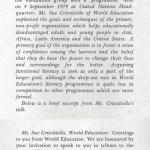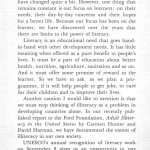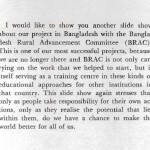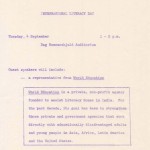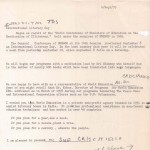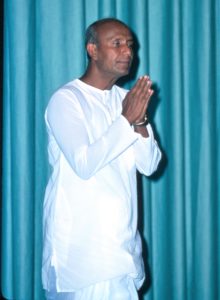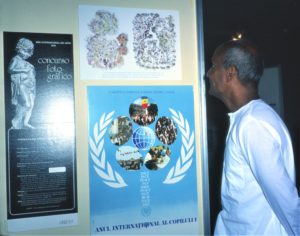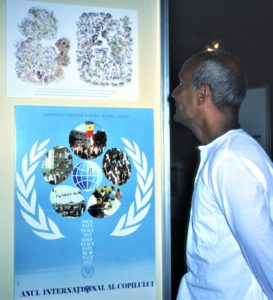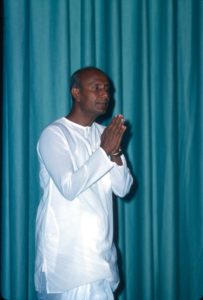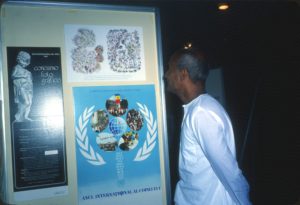UNESCO International Literacy Day, World Education – Meditation Group Sep 1979
Filed under UN Anniversaries14 September 1979 INTERNATIONAL LITERACY DAY, as proclaimed by UNESCO on 8 September, was marked by the meditation group with a programme held on 4 September at United Nations Headquarters. Ms. Sue Criscitiello of World Education explained the goals and techniques of the private, non-profit organisation which helps educationally disadvantaged adults and young people in Asia, Africa, Latin America and the United States. A primary goal of the organisation is to foster a sense of confidence among the learners and the belief that they do have the power to change their lives and surroundings for the better. Acquiring functional literacy is seen as only a part of the larger goal, although the drop-out rate in World Education’s literacy programmes is quite low in comparison to other programmes which are more formal. Below is a brief excerpt from Ms. Criscitiello’s talk.
Introduction
Literacy Day Began as result of the World Conference of Ministers of Education on the Eradication of Illiteracy,” held under the auspices of UNESCO in 1965.
The General Conference of UNESCO at its 14th Session proclaimed September 8 as International Literacy Day. In the host country this year it will be celebrated a week from yesterday September 10, since September 8 falls on a Saturday.
We will begin our programme with a meditation lead by Sri Chinmoy who himself has is the Author of nearly 400 books which have been translated into mapy languages. We are happy to have with us a representative of World Education~~Ms. Sue Criscitiello
Some of you might recall that Dr. Kobes, Director of Programs for World Education INC. addressed us in March of 1978 during our programme honouring The Peace Core and International Cooperation efforts such as the U.N. Volunteers.
World Education is a private non-profit agency founded in 1951 to assist Literacy house in India. It provides professional assistance in non-formal education techniques and has worked in over 45 countries
If you plan for a year,sow a seed.
If you plan for a decade,plant a tree.
If you plan for a century , educate the people.
I am pleased to present Ms. Sue Criscitiello
Ms. Sue Criscitiello, World Education:
Greetings to you from World Education. We are honoured by your invitation to speak to you in tribute to the cause of literacy. It is one that is very close to our organisational heart. As you have seen from our slide show, World Education has worked in the 24 field of education for adults for the past twenty eight years. Our first efforts were in India, where our founder Welthy Fisher’s dream to establish a “Village” where non-readers could come to learn was realised. Literacy House has been growing and flourishing since 1951. We have come a long way since those days, and our programmes and methods have changed quite a bit. However, one thing that remains constant is our focus on learners: on their needs, their day-by-day concerns and their hopes for a better life. Because our focus has been on the learner, we have discovered over the years that there are limits to the power of literacy.
Literacy is an educational need that goes handin- hand with other development needs. It has little meaning when offered as a pure benefit to people’s lives. It must be a part of education about better health, nutrition, agriculture, sanitation and so on. And it must offer some promise of reward to the learner. So we have to ask, as we plan a programme, if it will help people to get jobs, to care for their children and to improve their lives.
Another caution I would like to mention is that we must stop thinking of illiteracy as a problem in developing countries alone. In our recently published report to the Ford Foundation, Adult Illiteracy in the United States by Carmen Hunter and David Harman, we have documented the extent of illiteracy in our own society.
UNESCO’s annual recognition of literacy work on September 8 gives us an opportunity to pay tribute to the work that is being done in the field of literacy. But it also gives us an opportunity to put literacy into perspective, to recognise what it means, its value and its limitations.
I would like to show you another slide show about our project in Bangladesh with the Bangladesh Rural Advancement Committee (BRAC) . This is one of our most successful projects, because we are no longer there and BRAC is not only carrying on the work that we helped to start, but is itself serving as a training centre in these kinds of educational approaches for other institutions in that country. This slide show again stresses that only as people take responsibility for their own actions, only as they realise the potential that lies within them, do we have a chance to make the world better for all of us.
– excerpt from Meditation at the UN bulletin 1980-08-27-vol-08-n-08-aug
Download PDF format:
Gallery 1:
Click on small image below to see larger display:
Gallery 2: Photos dated September 1979which may have been from an opening meditation and a related display:
- Shrddha
- Shraddha
- Shraddha
- Shrddha
- Shraddha

